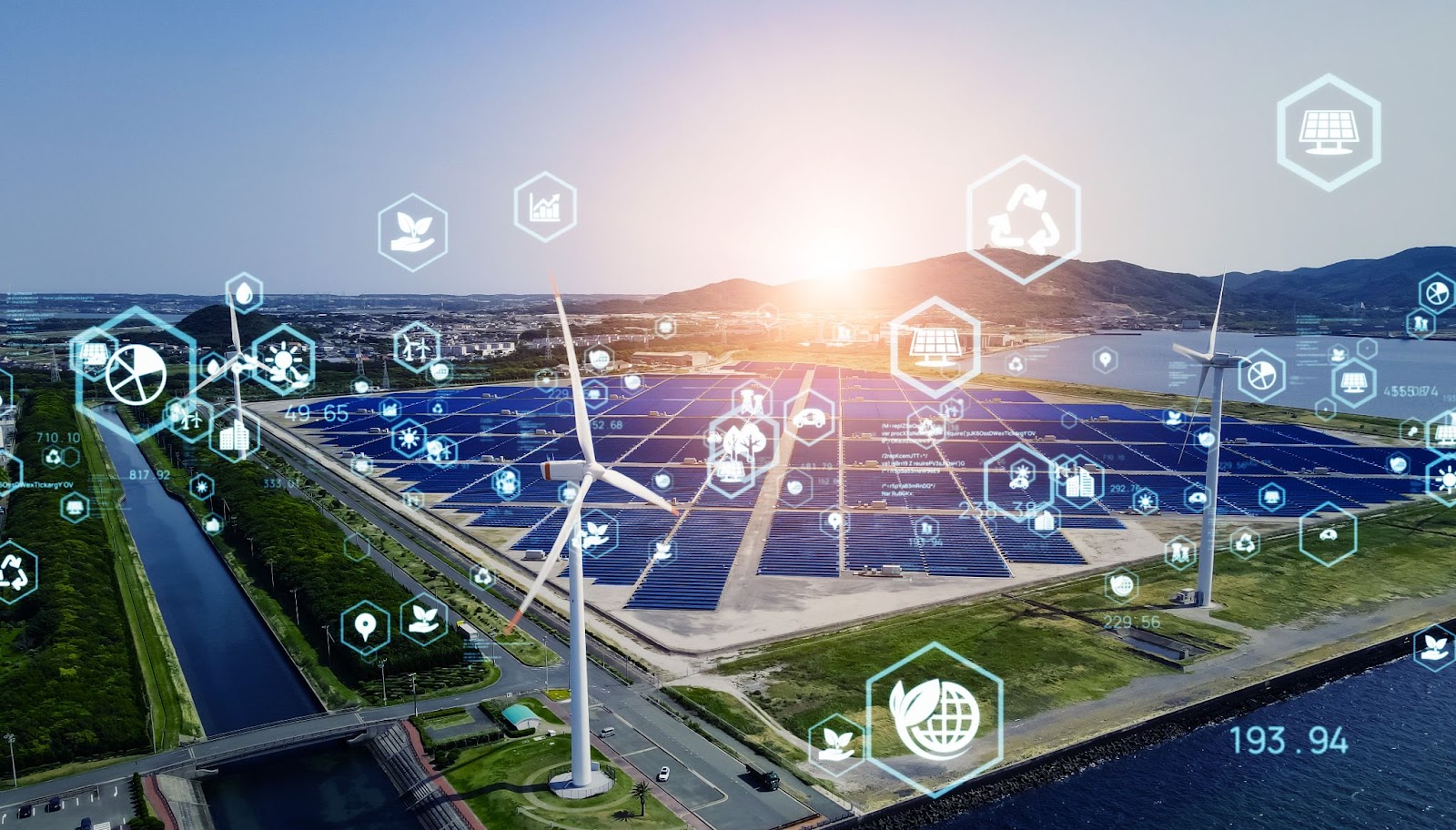Digital transformation in the energy industry has become pivotal for companies looking to adapt and thrive in an increasingly competitive market. To continue maintain and improve operational efficiencies , companies in the energy sector must adopt digital solutions that will facilitate digital transformation. We’ll discuss 5 innovative solutions that are leading digital transformation, as well as the associated benefits and challenges associated with digital transformation in the energy sector.
The Current State of the Energy Industry
The energy industry is undergoing a major transformation from traditional sources of fuel to renewable energy sources like solar, wind, and hydro. This shift comes with a variety of challenges, including technological limitations, and costs associated with installation and maintenance.
Despite these challenges, the global transition towards renewables has been gaining traction in recent years, with more investments being made to develop new technologies and strategies. For example, businesses are increasingly looking towards AI-powered analytics and cloud computing to increase efficiency.
Digital transformation in the energy industry is key to unlocking potential opportunities that come with this shift.
What is Digital Transformation in the Energy Industry?
Digital transformation in the energy industry involves harnessing technology to transform the way organizations do business.
In the energy industry, adopting new tech solutions can help improve efficiency in various sites such as oil, and gas production facilities or renewable power plants. Smart grids and intelligent systems are other energy industry trends that facilitate energy management on a detailed level.
5 Solutions Driving Digital Transformation in the Energy Industry
Here are a few different solutions and technologies that are revolutionizing digital transformation in the energy industry:
1. Internet of Things (IoT)
IoT technology allows devices to communicate with each other. These connected devices can monitor people and equipment within their environment through various sensors like temperature or pressure sensors and send this information back to a central system for analysis. This creates an intelligent ecosystem where machines can learn from each other’s experiences and make decisions based on data-driven insights.
Triax Technologies is a leader in the IoT field and provides end-to-end solutions for digital transformation in the energy industry. Our technology platform, Spot-r, can provide alerts for maintenance, detect anomalies and even predict machinery failure.
Benefits of IIoT
In the energy industry, Industrial Internet of Things (IIoT) solutions have many benefits, including:
- Allowing companies to remotely monitor equipment health in real-time, enabling them to identify potential issues before they escalate into critical problems, causing downtime or costly repairs
- Predicting when equipment will require maintenance based on historical usage patterns, reducing unplanned outages, and maximizing asset life cycles
- Facilitating better control over power consumption at industrial sites by analyzing usage trends across various timescales, such as daily, weekly, and monthly intervals
- Improving worker safety by monitoring environmental conditions, such as gas leaks or extreme temperatures
For example, Spot-r keeps track of where your equipment is, who is using it, and how often it’s being used.
2. Big data analytics
Big data refers to the massive amounts of information gathered from various sources and stored for analysis. In the energy industry, big data analytics can be used to gain insight into customer behavior, identify new market opportunities, optimize operations, and improve safety.
Benefits of big data analytics
By harnessing big data analytics capabilities combined with AI algorithms like machine learning models or neural networks, companies can:
- Gain actionable insights into their operations, enabling them to make better-informed decisions
- Detect potential equipment failures through continuous monitoring and real-time analysis, allowing proactive measures to be taken before costly downtime occurs
For example, our Spot-r cloud-based dashboard allows both on-site supervisors and off-site management to have real-time access to operations data for analysis.
You can access the dashboard anytime and from any device to get a complete overview of your workforce, equipment, site operations, and safety.
3. Artificial intelligence
At its base level, artificial intelligence (AI) means using machines to do things that previously required human intelligence. AI enables computers to recognize patterns in data, learn from their mistakes and make decisions without human input.
Benefits of AI
The benefits of AI in the energy industry are:
- Analyzing massive volumes of data at lightning speed (much faster than humans)
- Addressing customer service queries and issues
- Identifying risks and predicting potential problems
4. Blockchain
Blockchain is best known for facilitating cryptocurrency, but it can also be used in other industries, including the energy sector.
Benefits of blockchain
The benefits of blockchain include:
- Facilitating peer-to-peer (P2P) energy trading, which allows individuals to buy and sell energy from each other without having to go through an intermediary or utility company.
- Ensuring the secure and reliable transfer of data between connected devices.
- Facilitating energy efficiency by allowing energy producers and consumers to track energy usage in real-time. This helps reduce waste, optimize operations, and save money.
5. Renewable energy
Renewable energy refers to energy from natural sources such as the sun (solar energy) and wind (wind energy).
Benefits of renewable energy
The benefits of renewable energy solutions include:
- Reducing emissions and combating climate change
- Reducing dependence on fossil fuels
- Lowering energy costs for consumers
- Providing backup power in case of outages
Benefits of Digital Transformation in the Energy Industry
The benefits of digital transformation in the energy industry include:
- Improved operational efficiency: By automating manual tasks through IIoT devices or AI-driven systems, companies can significantly increase their productivity levels while reducing human-error risks.
- Better decision-making: Leveraging big data analytics enables organizations to gain valuable insights from vast amounts of information collected by sensors throughout their infrastructure networks. Companies can then use these insights to inform decision-making on optimizing resource allocation or predicting equipment maintenance needs.
- Innovative business models: Digital transformation in the energy industry opens up opportunities for companies within the energy sector to develop new revenue streams by offering value-added services such as real-time monitoring capabilities via mobile applications.
- Enhanced sustainability: By adopting renewable energy sources and implementing advanced technologies that optimize energy consumption, companies can significantly reduce their carbon footprint and contribute to global efforts towards combating climate change.
Challenges of Digital Transformation in the Energy Industry
Despite its numerous benefits, digital transformation in the energy industry also presents several challenges for organizations. Some critical obstacles within the power and energy industry include:
- Cybersecurity risks: Preventing unauthorized access is critical to ensure safety, privacy, and protection of proprietary information.
- Lack of skilled workforce: The speed of developments in digital transformation in the energy industry means that many companies can struggle to find workers with the ability to work with these new technologies.
- Inadequate investment: Funding remains a barrier for many companies looking to implement digital transformation in the energy industry initiatives as they often require substantial upfront investments.
What is the Role of Digital Technology in the Energy Transition?
Digital technology facilitates the integration of renewable energies, enhances grid management, and supports demand-side management through smart meters and IIoT devices.
Digital solutions like AI and big data analytics also help optimize operations and predict equipment maintenance needs.
How Is Technology Changing the Energy Industry?
Digital transformation is revolutionizing the energy industry by introducing innovative solutions that improve efficiency while reducing carbon emissions. Key advancements that will impact on the future of the energy industry include:
- Increased adoption of renewable energies
- Development of efficient storage systems
- Implementation of smart grids for better load balancing
- Utilization of IIoT devices for real-time monitoring
- Application of AI and big data analytics for enhanced decision-making
How Spot-r is Critical for Digital Transformation in the Energy Industry
The future of the energy industry is digital, and organizations must begin the process of digital transformation to remain competitive in an increasingly dynamic landscape.
Overall, digital transformation in the energy industry is a complex process that requires careful planning and execution. The benefits of implementing IIoT solutions, big data analytics and AI, blockchain technology, and renewable energies are numerous but come with their own set of challenges.
However, by embracing these technologies and solutions, companies can improve operational efficiency, reduce costs, and increase safety measures while enhancing sustainability.
Schedule a Demo of Spot-r to Jumpstart Your Digital Transformation Efforts
If you’re looking to implement digital transformation in the energy industry, Triax Technologies can help. Since 2012, we have provided a labor productivity platform to connect challenging environments across North America. Our IIoT platform, Spot-r, offers real-time, data-driven visibility to improve safety, streamline site access, boost worksite efficiency, and improve evacuation and muster procedures.
Book a demo today to see how Spot-r can jumpstart your organization’s digital transformation efforts, or learn more about our Spot-r platform.

